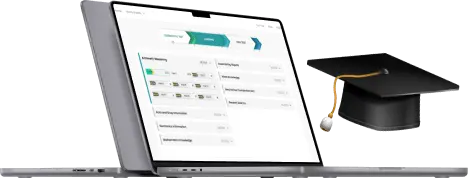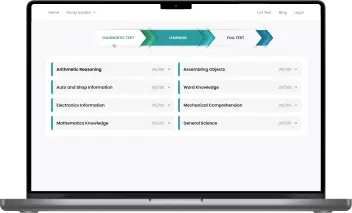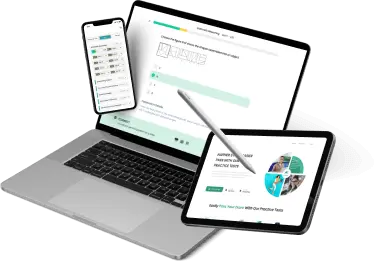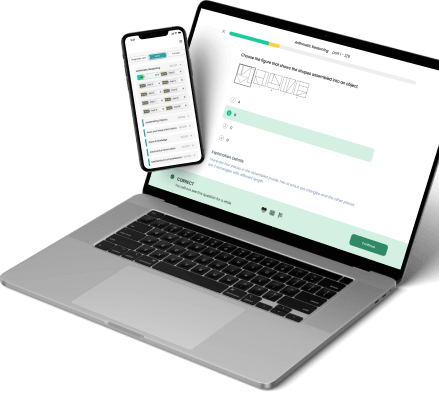Fun & effective AP Psychology practice test tool to pass with flying colors
All-in-one platform with everything you need to ace the AP Psychology on your first attempt
Clear and Thorough Learning Path
Proven AP PSYCHOLOGY 3-step Practice Formula
After our 100,000+ users' success stories, we developed a 3-step strategy to provide you with the most precise and in-depth learning path while minimizing your prep time.AP Psychology Diagnostic Test
First, take this short test and get your detailed report showing your strong and weak areas. Save your time by concentrating on what is in demand.Learning
With quick, bite-sized learning techniques and a detailed study guide for each AP Psychology section, you can really strengthen your weaknesses (from step 1) and boost your scores.AP Psychology Full Test
The last step for your preparation is taking our full AP Psychology practice tests and seeing how far you've come since the beginning. Repeat the 3-step formula until you are satisfied with your results!Ready to start?
Thousands of AP Psychology users already accomplished their goals.NOW it’s your turn!

What You Get

All-in-one platform
A complete AP Psychology Prep Platform, including a diagnostic test, detailed study guides for all topics, practice questions with step-by-step explanations, and various full simulator tests.
Questions nearly identical to those in the real AP Psychology test
All questions are categorized into the specific sections as on the real AP Psychology: Same format & same difficulty!
Best for the busy
Easily & quickly grasp all the knowledge with our unique learning technique. And you can learn anytime, anywhere on any devices, even with a few free minutes.
Practice while having fun
Learn and play! Complete round-by-round to reach your daily achievement and make progress on your learning journey!Featured on















What our users are saying
Over 50,000 aspiring American candidates use AP Psychology monthlyMany high schools offer Advanced Placement Psychology, also known as AP Psychology, which is an introductory psychology course at the college level. Students can obtain college credit by taking the course through the College Board's Advanced Placement Program. Students take the course to get ready for the AP Psychology exam, which covers a wide range of topics from an introductory psychology course in college.
The AP Psychology test consists of two sections. One hundred multiple-choice questions make up the first section, which lasts for 70 minutes and accounts for two-thirds of the exam grade; and two essay-based free-response questions make up the second section, which lasts for 50 minutes and accounts for one-third of the exam grade.
What Does The AP Psychology Exam Cover?
The nine units of the course evaluated in the multiple-choice section of the AP Exam are:
- Unit 1: Scientific Foundations of Psychology (10–14%): Introduction to Psychology; Research Methods in Psychology; Psychological Science Definition: The Experimental Method; Choosing a Research Method; Psychological Statistical Analysis; Ethical Principles in Psychology
- Unit 2: Biological Bases of Behavior (8–10%): Hereditary and Environmental Interactions; The Endocrine System; Nervous System and Neuron Overview; Firing of neurons; Drug Effects on Neural Firing The Mind; Examining Brain Structure and Function Tools The Brain's Adaptability; Sleep and Imagination
- Unit 3: Sensation and Perception (6–8%): Sensation Principles; Perception Principles; Visual Anatomy and Perception; Auditory Sensation and Perception; Chemical Senses; Body Sense
- Unit 4: Learning (7–9%): Introduction to Learning; Classical Conditioning; Operant Conditioning; Social and Cognitive Learning Factors
- Unit 5: Cognitive Psychology (13–17%): Introduction to Memory; Encoding; Storing; Retrieving; Forgetting; and Memory Distortion; Memory's Biological Foundations; Thinking and Problem Solving Fundamentals; Thinking Biases and Errors Intelligence Fundamentals; Principles of Psychometrics and Intelligence Testing Language Components and Language Acquisition
- Unit 6: Developmental Psychology (7–9%): Adolescent Development; Adulthood and Aging; Lifespan and Physical Development in Childhood; Social Development in Childhood; Cognitive Development in Childhood; Adolescent Development; Moral Advancement; Gender Identity and Sexual Orientation
- Unit 7: Motivation, Emotion, and Personality (11–15%): Theories of Motivation, Emotion, and Personality; Specific Motivation Topics; Emotion Theories; Stress and Coping Personality Introduction; Personality Psychoanalytic Theories; Personality Theories Based on Behaviorism and Social Cognitive Theory; Humanistic Personality Theories; Personality Trait Theories; Personality Assessment
- Unit 8: Clinical Psychology (12–16%): Introduction to Psychological Disorders; Psychological Perspectives and Disorder Etiology; Clinical Psychology: Disorders of Neurodevelopment and Schizophrenia Spectrum; Trauma and stressor-related symptoms, as well as dissociative and somatic symptoms and disorders; Feeding and Eating Disorders, Substance, and Addictive Disorders, and Personality Disorders Introduction to Psychological Disorder Treatment; Bipolar Disorder, Major Depressive Disorder, Anxiety Disorder, Obsessive-Compulsive Disorder, and Related Disorders; Disorder Treatment from a Biological Perspective; Psychological Perspectives and Disorder Treatment; Evaluating Strengths, Weaknesses, and Empirical Support for Disorder Treatments
- Unit 9: Social Psychology (8–10%): Attribution Theory and Person Perception; Attitude Formation and Change; Conformity, Compliance, and Obedience; Social Psychology: Influence of Groups on Behavior and Mental Processes; Discrimination, bias, and prejudice; Aggression and altruism; Attraction Between People
Regarding the free-response questions:
- Question 1: Concept Application tests students' abilities to explain behavior and use theories and viewpoints in real-world situations.
- Question 2: Research Design tests students' abilities to analyze psychological research studies such as the analysis and interpretation of quantitative data.
How does the AP Psychology Test score?
Scores for the AP exam range from 1 to 5. Colleges typically require a 4 or 5, however, some may grant credit for a 3. The meaning of each score is as follows:
|
Score |
Meaning |
|
1 |
No recommendation |
|
2 |
Possibly qualified |
|
3 |
Qualified |
|
4 |
Well qualified |
|
5 |
Extremely qualified |
How to Register for the test?
If your school offers AP psychology classes, talk to your counselor about enrolling in the course. If it has an AP Coordinator, tell him/her that you want to take the test. The coordinator will then sign you up for the exam, collect the exam fees, and inform you of the test's time and location. You can still enroll in independent study or take an online AP course offered in your state if you are homeschooled or if your school doesn't offer AP courses. To be connected with a coordinator, homeschooled students must get in touch with AP Services by September 4. The coordinator will then assist you in finding a school willing to conduct the exam.
Our AP Psychology practice tests
A good AP psychology practice test can assist you in feeling most prepared for the AP psychology exam. There are two main ways that AP psych practice tests can assist you in studying for and passing the exam.
The first benefit of AP psych practice tests is that they typically use questions from previous years. Viewing old questions allows you to become acquainted with the terminology and format of the questions.
This allows you to finish the test faster because you won't have to figure out what the question is trying to ask. You need all the time you can get on this AP exam because each question is less than a minute long.
The second advantage practice tests provide is that they allow you to better understand how the units are divided within the test. Though the percentages are provided above, seeing them and answering the questions can provide you with a better understanding of what that looks like.
You will be a more effective student if you become familiar with topic distribution by specifically digging into the topics that are more common on the AP psych exam.
Because AP psych practice tests frequently provide lengthy explanations for why certain answers are correct, you will likely grow and learn faster than if you simply studied flashcards or review guides.
If you're stressed out about AP Psychology and you feel like you don't understand some concepts very well but can't figure out where your knowledge is lacking, our AP Psychology Practice Tests can help. Each test includes AP Psychology questions just like those on the real exam. If you miss a question, you can figure out what goes wrong by viewing the thorough explanation. With our AP Psychology Practice Tests, you will soon ace this exam with flying colors.






